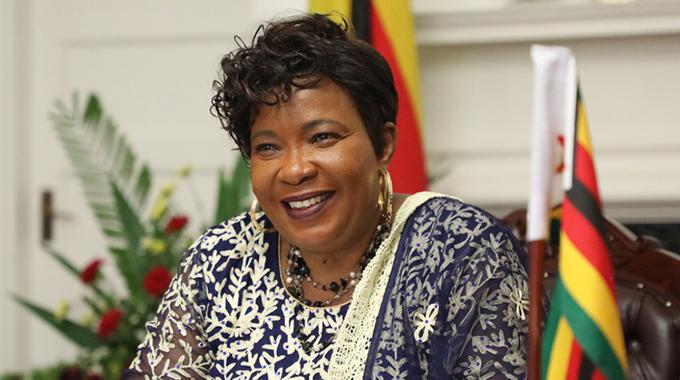News / Local
Zimbabwe activists under scrutiny over Mnangagwa wife's UK visit?
5 hrs ago | Views

There are unconfirmed reports that the Government of Zimbabwe has ramped up its surveillance and crackdown on diaspora-based citizens accused of engaging in activities perceived to undermine the country's sovereignty and international image.
This move follows the sudden cancellation of First Lady Auxillia Mnangagwa's planned appearance at the prestigious FLAIR Women's Summit in London, amid what officials have described as "serious security threats" posed by planned protests and petitions spearheaded by Zimbabwean activists in the United Kingdom.
Sources within the Ministry of Foreign Affairs and International Trade confirmed that the First Lady's itinerary had included high-profile engagements, including a VIP reception at Harrods and closed-door investment meetings. However, the trip was reportedly aborted at the last minute due to growing diplomatic pressure and fear of public embarrassment stemming from mobilised opposition by diaspora-based pressure groups.
"She was expected to engage with international business leaders and investors, but due to serious security threats, the trip had to be called off," said an official within the ministry.
Following the diplomatic setback, the First Lady is said to have redirected her efforts to the Middle East, where she held what the ministry described as "fruitful engagements" with Arab leaders and Indian business representatives in a bid to maintain momentum on Zimbabwe's international engagement efforts.
In response to the incident, the Zimbabwean government has reportedly invoked the Criminal Law (Codification and Reform) Amendment Act of 2023, commonly referred to as the "Patriotic Act." The controversial legislation criminalises actions perceived as injurious to national sovereignty, including collaborating with foreign governments, media, or NGOs in ways deemed damaging to Zimbabwe's interests.
Security officials revealed that the government has compiled an expanded watchlist of Zimbabweans in the diaspora suspected of organising anti-government demonstrations, lobbying foreign governments, or disseminating content critical of the state.
The list reportedly includes Zimbabweans based in Canada, the United States, the United Kingdom, South Africa, Ireland, China, and Australia, among others.
"The government has reason to believe that certain individuals in the diaspora are actively working to destabilise Zimbabwe's diplomatic re-engagement efforts through misinformation, petitions, and protest campaigns," a senior security source said.
Critics, however, argue that the government's move is a suppression of dissent and a violation of the constitutional rights of citizens abroad. Human rights organisations have raised concern that the "Patriotic Act" is being used to intimidate Zimbabweans who voice legitimate concerns about governance and human rights violations.
The government maintains that while it respects the right to freedom of expression, actions that are seen as attempts to tarnish Zimbabwe's image or sabotage diplomatic engagements will be met with full legal consequences.
As tensions simmer, the diplomatic fallout from the First Lady's cancelled UK visit may mark a new phase in the state's efforts to control its international narrative — particularly as the country heads toward a sensitive period of re-engagement with global institutions and investors.
This move follows the sudden cancellation of First Lady Auxillia Mnangagwa's planned appearance at the prestigious FLAIR Women's Summit in London, amid what officials have described as "serious security threats" posed by planned protests and petitions spearheaded by Zimbabwean activists in the United Kingdom.
Sources within the Ministry of Foreign Affairs and International Trade confirmed that the First Lady's itinerary had included high-profile engagements, including a VIP reception at Harrods and closed-door investment meetings. However, the trip was reportedly aborted at the last minute due to growing diplomatic pressure and fear of public embarrassment stemming from mobilised opposition by diaspora-based pressure groups.
"She was expected to engage with international business leaders and investors, but due to serious security threats, the trip had to be called off," said an official within the ministry.
Following the diplomatic setback, the First Lady is said to have redirected her efforts to the Middle East, where she held what the ministry described as "fruitful engagements" with Arab leaders and Indian business representatives in a bid to maintain momentum on Zimbabwe's international engagement efforts.
In response to the incident, the Zimbabwean government has reportedly invoked the Criminal Law (Codification and Reform) Amendment Act of 2023, commonly referred to as the "Patriotic Act." The controversial legislation criminalises actions perceived as injurious to national sovereignty, including collaborating with foreign governments, media, or NGOs in ways deemed damaging to Zimbabwe's interests.
Security officials revealed that the government has compiled an expanded watchlist of Zimbabweans in the diaspora suspected of organising anti-government demonstrations, lobbying foreign governments, or disseminating content critical of the state.
The list reportedly includes Zimbabweans based in Canada, the United States, the United Kingdom, South Africa, Ireland, China, and Australia, among others.
"The government has reason to believe that certain individuals in the diaspora are actively working to destabilise Zimbabwe's diplomatic re-engagement efforts through misinformation, petitions, and protest campaigns," a senior security source said.
Critics, however, argue that the government's move is a suppression of dissent and a violation of the constitutional rights of citizens abroad. Human rights organisations have raised concern that the "Patriotic Act" is being used to intimidate Zimbabweans who voice legitimate concerns about governance and human rights violations.
The government maintains that while it respects the right to freedom of expression, actions that are seen as attempts to tarnish Zimbabwe's image or sabotage diplomatic engagements will be met with full legal consequences.
As tensions simmer, the diplomatic fallout from the First Lady's cancelled UK visit may mark a new phase in the state's efforts to control its international narrative — particularly as the country heads toward a sensitive period of re-engagement with global institutions and investors.
Source - NewZimbabwe























